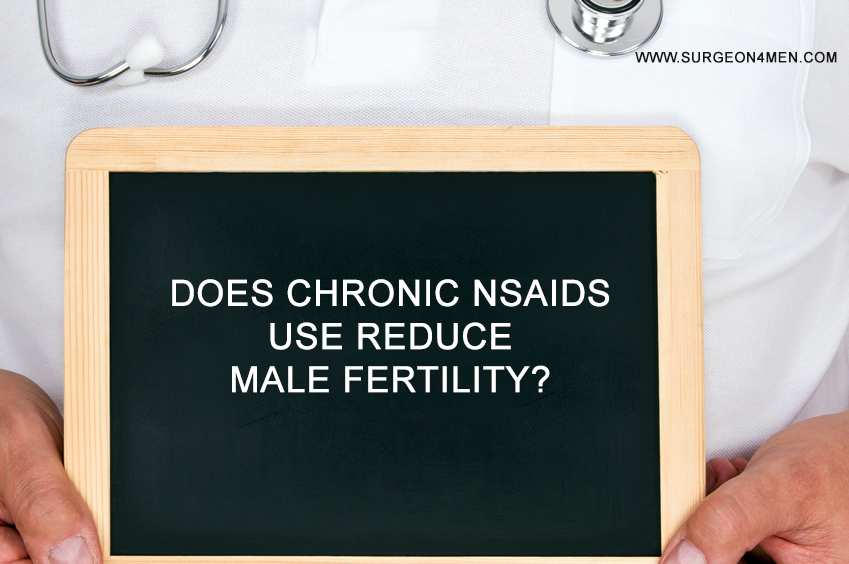Does Chronic NSAIDs Use Reduce Male Fertility?
It is not a secret that chronic drug use or intake of certain compounds can adversely affect male fertility, depending upon the dose (or potency of drug) and duration of use. Unfortunately, due to poor lifestyle and dietary choices, most people rely on pharmacological agents in order to feel better and perform well.
According to a new study reported in the Pharmacoepidemiology and Drug Safety journal (1), investigators analyzed outpatient data from 2011 to 2014 at a fertility assessment clinic and concluded that:
- 46.7% males (or 244 of 522 participants) who experienced infertility reported a positive history of some type of drug use
- Mean drug use was found to be 2.3 drugs (from a list of over 201 popular drugs).
- 15.9% patients reported documented fertility impairment and 51.2% agreed that they are experiencing some degree of sexual dysfunction.
Investigators concluded that a large percentage of men unintentionally consume pharmacological agents that may harm their fertility; unfortunately, easy availability and conventional ‘high-safety’ profile of OTC (over-the-counter) medications makes it often hard for physicians to detect the exact pathophysiology in some men.
Does NSAIDs Use Affect Male Fertility?
Mild analgesics are mostly available as over-the-counter formulations and are known to adversely affect male fertility by a number of mechanisms. For example, according to a new study reported in the Human Reproduction journal (2), investigators suggested that chronic intake of mild analgesics such as aspirin, indomethacin, paracetamol, ibuprofen etc. can disrupt the natural endocrinological balance and may negatively affect the normal functioning of male testes. Here’s how:
- After any standard dose of an analgesic, the drug levels in the interstitial fluid of testes were comparable to the plasma drug levels; suggesting that most analgesic molecules can cross blood-testicular barrier.
- The Leydig cell’s production of insulin-like growth factor and testosterone suffered significantly after consumption of analgesics. It is no brainer that low testosterone can adversely affect male fertility and sperm production.
- The Sertoli cell’s production of inhibin (an important hormone) also suffered marginally when exposed to aspirin.
- Moderate consumption of analgesics affects anti-PG activity (that is vital to spermatogenesis). Scientific research is underway to establish the link between testosterone levels and anti-PG activity.
A number of other studies suggested some mechanisms that may explain compromised fertility reported with chronic NSAIDs use:
- Damage to sperm producing machinery due to direct damage to delicate tissues.
- Oxidative/ chemical injury to sperms as a result of increased free radical production (as seen with most NSAIDs)
- Alteration in the supply of blood to the genital region (which is also responsible for peptic ulceration and some other adverse effects associated with NSAIDs use)
Who Is At Risk Of Developing Impaired Fertility With NSAIDs Use?
NSAIDs are usually consumed by individuals for acute management of mild to moderate pain or aches (especially when the symptoms are due to acute inflammation). Some common indications of NSAIDs are:
- Patients suffering from chronic musculoskeletal issues such as rheumatoid arthritis or osteoarthritis.
- Individuals who are recovering from a traumatic accident, surgery or medical procedure.
- People who live a very stressful life (such as computer operators, business personnel etc.) and experiences recurrent attacks of headaches, backache, neck pain etc.
- Athletes or individuals who lives a highly dynamic lifestyle.
If you are suffering from a serious musculoskeletal ailment or a bodily dysfunction, speak to a healthcare professional instead of self-medicating or self-treating yourself. It is imperative to mention that several factors can contribute to male infertility. Speak to your primary care provider if you have questions about sexual health or fertility.
References:
1. Pompe, S. V., Strobach, D., Stief, C. G., Becker, A. J., & Trottmann, M. (2016). Drug use among men with unfulfilled wish to father children: a retrospective analysis and discussion of specific drug classes. Pharmacoepidemiology and drug safety.
2. Albert, O., Desdoits-Lethimonier, C., Lesné, L., Legrand, A., Guillé, F., Bensalah, K., … & Jégou, B. (2013). Paracetamol, aspirin and indomethacin display endocrine disrupting properties in the adult human testis in vitro. Human reproduction, 28(7), 1890-1898.
3. Yokota, H., Eguchi, S., Hasegawa, S., Okada, K., Yamamoto, F., Sunagawa, A., … & Nakano, E. (2015). Assessment of in vitro antiovulatory activities of NSAIDs and comparison with in vivo reproductive toxicities of medaka (Oryzias latipes). Environmental toxicology.
